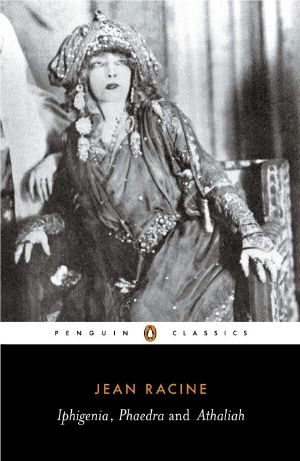Iphigenia; Phaedra; Athaliah (Translated by John Cairncross 1963)

- Authors
- Jean Racine
- Publisher
- Penguin Books; Penguin Group
- Tags
- literature , plays
- Date
- 1674-01-01T16:00:00+00:00
- Size
- 0.48 MB
- Lang
- en
Paperback, 320 pages
Published: 1674
Edition: Penguin Books (2004)
Greatest Books (amalgamated list of best books)
Translation and Introduction by: John Cairncross (1963)
Foreword by: John Cairncross (1970)
Strongly influenced by Classical drama, Jean Racine (1639-99) broke away from the grandiose theatricality of baroque drama to create works of intense psychological realism, with characters manipulated by cruel and vengeful gods. Iphigenia depicts a princess's absolute submission to her father's will, despite his determination to sacrifice her to gain divine favour before going to war. Described by Voltaire as 'the masterpiece of the human mind', Phaedra shows a woman's struggle to overcome her overwhelming passion for her stepson - an obsession that brings destruction to a noble family. And Athaliah portrays a ruthless pagan queen, who defies Jehovah in her desperate attempt to keep the throne of Jerusalem from its legitimate heir.
About the Author
Jean Racine was born in 1639 at La Ferté Milon, sixty miles east of Paris. Orphaned at an early age, he was educated at the Little Schools of Port Royal and the pro-Jansenist College of Beauvais. He soon reacted against his austere mentors and by 1660 he had begun to write for the theater and had been introduced to the court of Louis XIV. In 1677, when he had ten plays to his credit and was high in favor with both the court and the public, he abandoned the theatre, which was regarded as far from respectable by the Church, and joined the Establishment as Royal Historiographer. It was only after a silence of twelve years that he wrote his last two plays (both on religious subjects), Esther and Athaliah. He died in 1699.